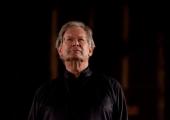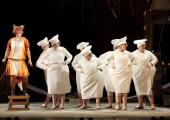Mutter, LSO, Sir Colin Davis, Barbican

London's loudest hall constricts the fervour of Janáček's Glagolitic Mass
Just a month after the end of the 2010 BBC Proms, can nostalgia really be setting in for the swimming-pool colosseum of the Royal Albert Hall? On Friday I missed its warming echo-effect around Delius, and last night we needed both its cavernous recesses and its king of instruments (the Barbican has none to call its own), preferably played by a top organist, for what Janáček imaged in 1927 as the outdoor worship of his Glagolitic Mass. With Sir Colin Davis rightly pushing its fervour to violent limits, the Barbican experience was like being stuck in a jar with angry, buzzing wasps.
Just a month after the end of the 2010 BBC Proms, can nostalgia really be setting in for the swimming-pool colosseum of the Royal Albert Hall? On Friday I missed its warming echo-effect around Delius, and last night we needed both its cavernous recesses and its king of instruments (the Barbican has none to call its own), preferably played by a top organist, for what Janáček imaged in 1927 as the outdoor worship of his Glagolitic Mass. With Sir Colin Davis rightly pushing its fervour to violent limits, the Barbican experience was like being stuck in a jar with angry, buzzing wasps.









